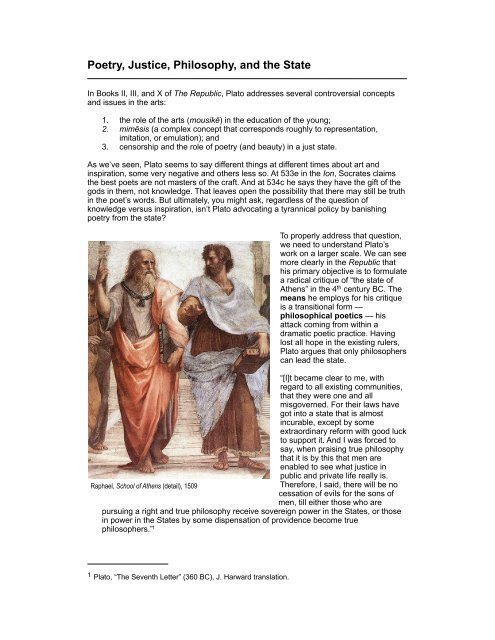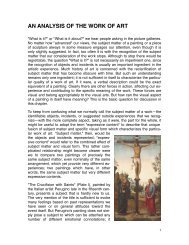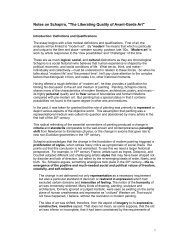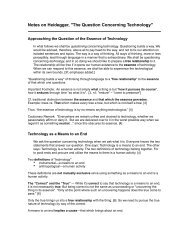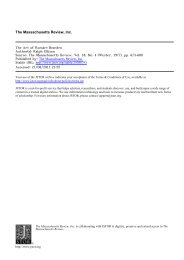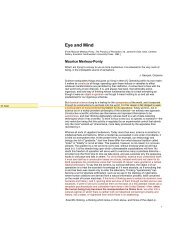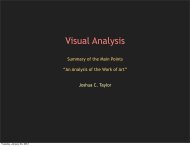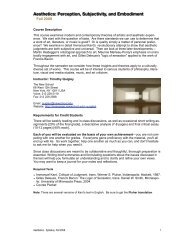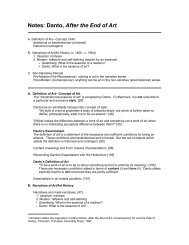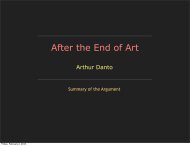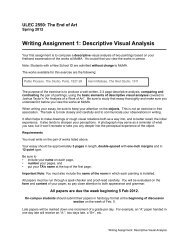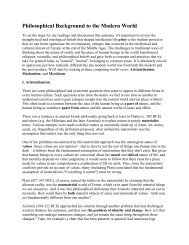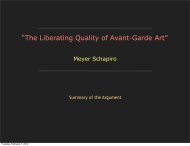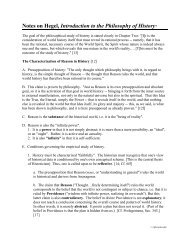Poetry, Justice, Philosophy, and the State - Timothy R. Quigley
Poetry, Justice, Philosophy, and the State - Timothy R. Quigley
Poetry, Justice, Philosophy, and the State - Timothy R. Quigley
Create successful ePaper yourself
Turn your PDF publications into a flip-book with our unique Google optimized e-Paper software.
<strong>Poetry</strong>, <strong>Justice</strong>, <strong>Philosophy</strong>, <strong>and</strong> <strong>the</strong> <strong>State</strong>In Books II, III, <strong>and</strong> X of The Republic, Plato addresses several controversial concepts<strong>and</strong> issues in <strong>the</strong> arts:1. <strong>the</strong> role of <strong>the</strong> arts (mousikē) in <strong>the</strong> education of <strong>the</strong> young;2. mimēsis (a complex concept that corresponds roughly to representation,imitation, or emulation); <strong>and</strong>3. censorship <strong>and</strong> <strong>the</strong> role of poetry (<strong>and</strong> beauty) in a just state.As we’ve seen, Plato seems to say different things at different times about art <strong>and</strong>inspiration, some very negative <strong>and</strong> o<strong>the</strong>rs less so. At 533e in <strong>the</strong> Ion, Socrates claims<strong>the</strong> best poets are not masters of <strong>the</strong> craft. And at 534c he says <strong>the</strong>y have <strong>the</strong> gift of <strong>the</strong>gods in <strong>the</strong>m, not knowledge. That leaves open <strong>the</strong> possibility that <strong>the</strong>re may still be truthin <strong>the</strong> poet’s words. But ultimately, you might ask, regardless of <strong>the</strong> question ofknowledge versus inspiration, isn’t Plato advocating a tyrannical policy by banishingpoetry from <strong>the</strong> state?To properly address that question,we need to underst<strong>and</strong> Plato’swork on a larger scale. We can seemore clearly in <strong>the</strong> Republic thathis primary objective is to formulatea radical critique of “<strong>the</strong> state ofA<strong>the</strong>ns” in <strong>the</strong> 4 th century BC. Themeans he employs for his critiqueis a transitional form —philosophical poetics — hisattack coming from within adramatic poetic practice. Havinglost all hope in <strong>the</strong> existing rulers,Plato argues that only philosopherscan lead <strong>the</strong> state.“[I]t became clear to me, withregard to all existing communities,that <strong>the</strong>y were one <strong>and</strong> allmisgoverned. For <strong>the</strong>ir laws havegot into a state that is almostincurable, except by someextraordinary reform with good luckto support it. And I was forced tosay, when praising true philosophythat it is by this that men areenabled to see what justice inpublic <strong>and</strong> private life really is.Raphael, School of A<strong>the</strong>ns (detail), 1509Therefore, I said, <strong>the</strong>re will be nocessation of evils for <strong>the</strong> sons ofmen, till ei<strong>the</strong>r those who arepursuing a right <strong>and</strong> true philosophy receive sovereign power in <strong>the</strong> <strong>State</strong>s, or thosein power in <strong>the</strong> <strong>State</strong>s by some dispensation of providence become truephilosophers.” 11 Plato, “The Seventh Letter” (360 BC), J. Harward translation.
That said, <strong>the</strong> Republic should not be read as a program for <strong>the</strong> educational foundation<strong>and</strong> structure of <strong>the</strong> state. Ra<strong>the</strong>r Plato is trying to show what is needed to bring <strong>the</strong> justindividual into harmony with a just community. The question is what it will take to bring<strong>the</strong> individual’s inner state <strong>and</strong> <strong>the</strong> public state toge<strong>the</strong>r in justice.On Plato’s view, poetry must be understood in <strong>the</strong> context of a just state. That gives us away to read <strong>and</strong> assess <strong>the</strong> Republic. 2We should also keep in mind <strong>the</strong> sophists’ attempts to reinforce a new ethos in whichjustice was simply a pragmatic response to mistrust, fear, <strong>and</strong> self-interest. This isexpressed in <strong>the</strong> Sophist’s claim: “No one does what is right voluntarily.” Plato followsSocrates in arguing that justice is more “a condition of <strong>the</strong> soul” than a relation to o<strong>the</strong>rs.It exists not when each person watches over o<strong>the</strong>rs, but when each watches over <strong>the</strong>irown soul <strong>and</strong> behavior. It was in that spirit that politics <strong>and</strong> pedagogy would be pursuedby Plato <strong>and</strong> his followers.Thus, <strong>the</strong> model for real education is not <strong>the</strong> ideal state of <strong>the</strong> Republic, but <strong>the</strong> processexemplified in Plato’s text <strong>and</strong> practiced in his Academy, where education thrives onquestioning <strong>and</strong> research, not <strong>the</strong> administration of principles, prohibitions, <strong>and</strong>sanctions.Thus, Plato’s proposal is not sophistic or Hobbesian — not a social contract for mutualself-protection. Ra<strong>the</strong>r it’s intended to be a condition that allows humans to rise aboveself-interest in taming <strong>and</strong> harmonizing <strong>the</strong> tyrannical <strong>and</strong> <strong>the</strong> philosophical aspects of<strong>the</strong> soul. The real danger for Plato is not so much art <strong>and</strong> artists. Ra<strong>the</strong>r, it is ethicaleducation <strong>and</strong> sophists.The poets, for <strong>the</strong>ir part, can play a role by looking to reality <strong>and</strong> <strong>the</strong> needs of <strong>the</strong>community ra<strong>the</strong>r than mere imitations appealing to popular opinion. (Republic 602ab;604d-605a)<strong>Timothy</strong> <strong>Quigley</strong>, revised 14 Aug 132Hans-Georg Gadamer, “Plato <strong>and</strong> <strong>the</strong> Poets”, in Dialogue <strong>and</strong> Dialectic: Eight HermeneuticalStudies on Plato, trans. P. Christopher Smith, New Haven: Yale University Press, 1980.


